BCO5501 Business Process Engineering: BPM Review Essay Report
VerifiedAdded on 2023/06/04
|10
|3058
|189
Report
AI Summary
This report provides a comprehensive review of business process engineering (BPE) and business process management (BPM), drawing on various academic sources to analyze the impact of process modeling on organizational efficiency. The report begins with an introduction to BPE, emphasizing its role in improving cost-effectiveness and quality through detailed process analysis. It then delves into a literature review, examining the views of multiple authors on the benefits of BPM, including automation, customer satisfaction enhancement, and the reduction of operational costs. The report explores how BPM facilitates process design, execution, monitoring, and optimization. Challenges such as data understanding and implementation costs are also discussed. The conclusion summarizes the significance of BPM in modern organizations, highlighting its role in achieving strategic objectives and enhancing overall business value. The report underscores the importance of BPM in streamlining processes, improving communication, and fostering a competitive advantage. The report also examines the role of BPM in improving customer relationships, increasing transparency, and reducing errors in decision-making.
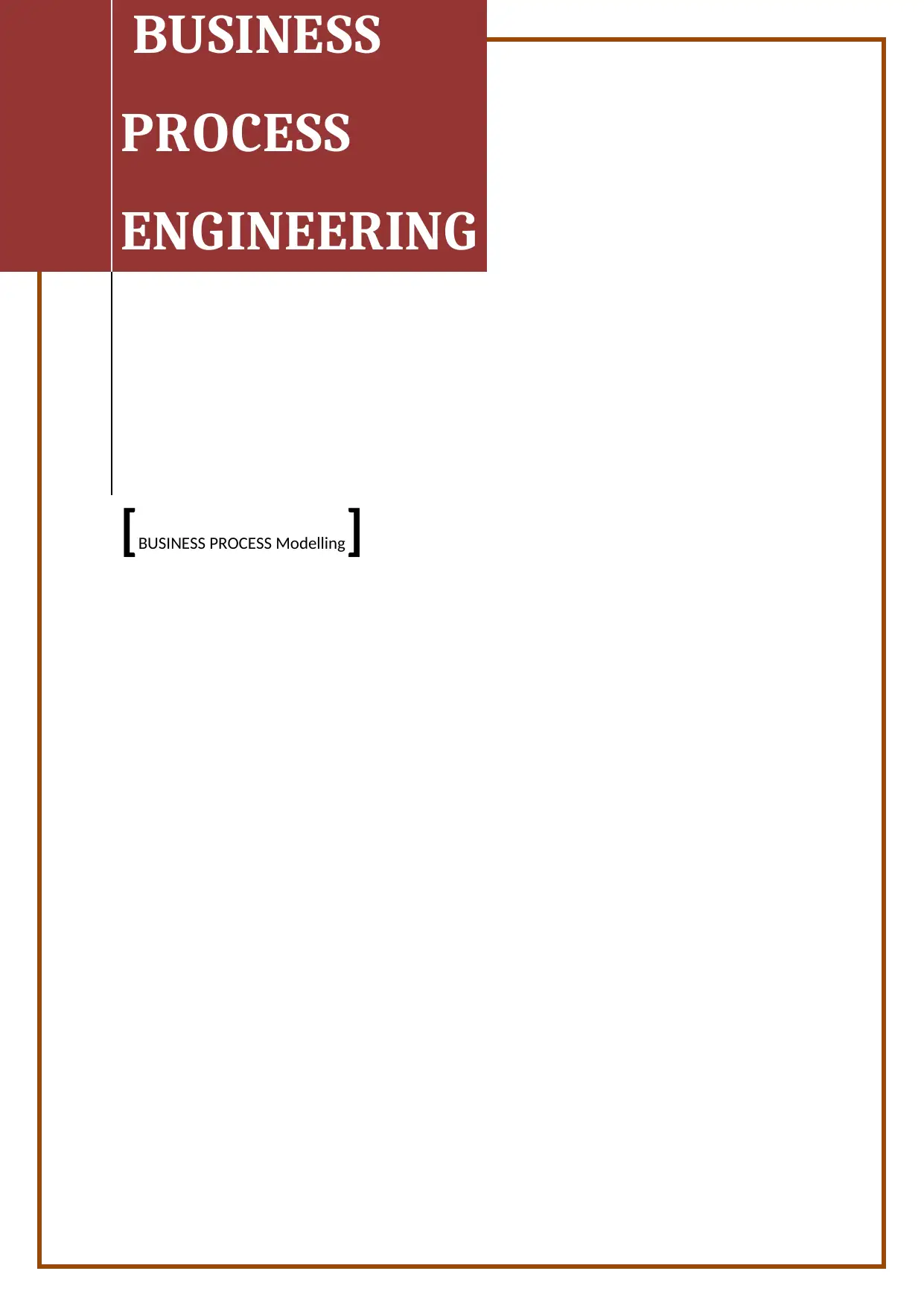
[BUSINESS PROCESS Modelling]
BUSINESS
PROCESS
ENGINEERING
BUSINESS
PROCESS
ENGINEERING
Paraphrase This Document
Need a fresh take? Get an instant paraphrase of this document with our AI Paraphraser

1 | P a g e B U S I N E S S P R O C E S S
E N G I N E E R I N G
Table of Contents
Introduction................................................................................................................................2
Literature review........................................................................................................................2
Conclusion..................................................................................................................................6
References..................................................................................................................................7
E N G I N E E R I N G
Table of Contents
Introduction................................................................................................................................2
Literature review........................................................................................................................2
Conclusion..................................................................................................................................6
References..................................................................................................................................7
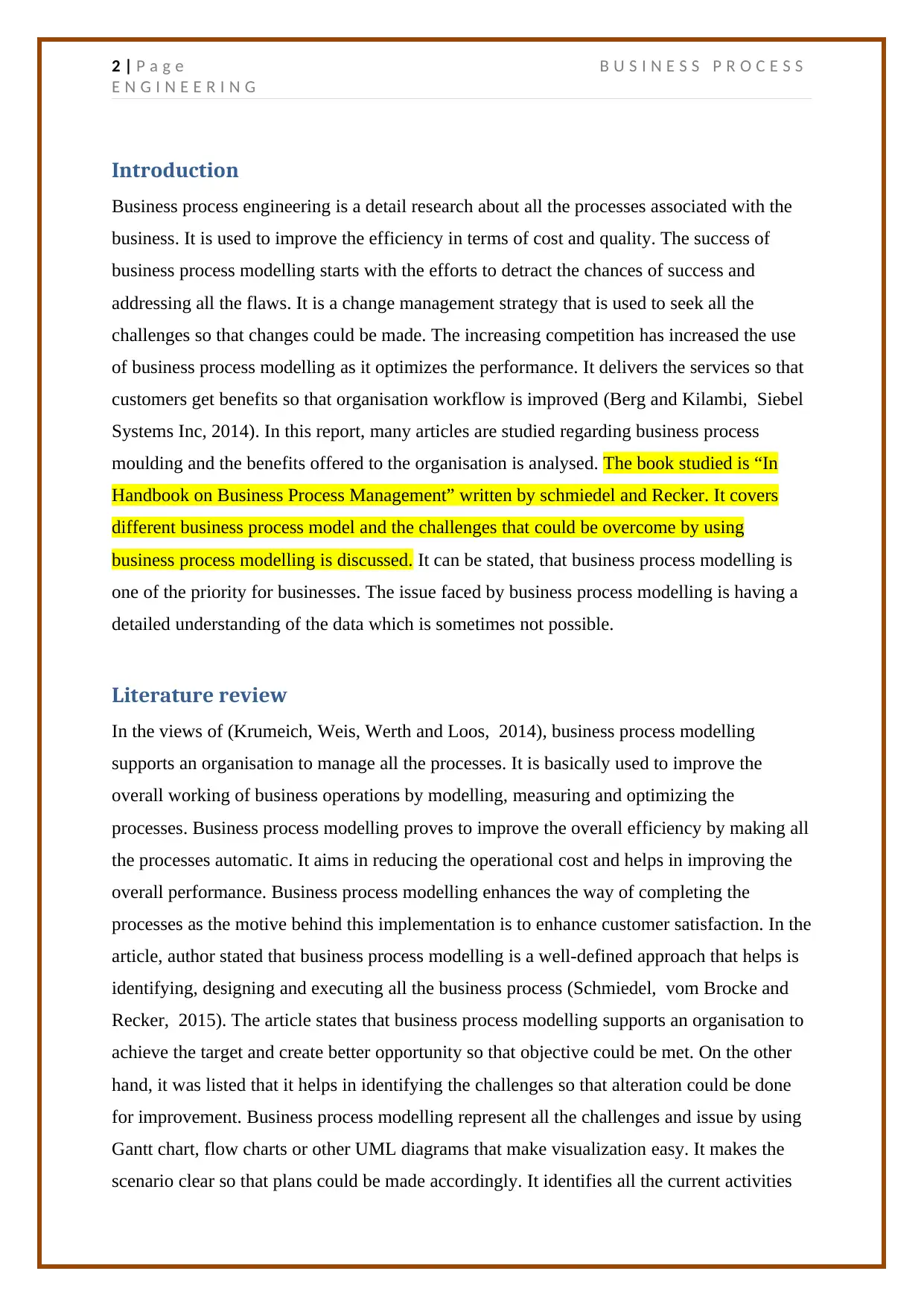
2 | P a g e B U S I N E S S P R O C E S S
E N G I N E E R I N G
Introduction
Business process engineering is a detail research about all the processes associated with the
business. It is used to improve the efficiency in terms of cost and quality. The success of
business process modelling starts with the efforts to detract the chances of success and
addressing all the flaws. It is a change management strategy that is used to seek all the
challenges so that changes could be made. The increasing competition has increased the use
of business process modelling as it optimizes the performance. It delivers the services so that
customers get benefits so that organisation workflow is improved (Berg and Kilambi, Siebel
Systems Inc, 2014). In this report, many articles are studied regarding business process
moulding and the benefits offered to the organisation is analysed. The book studied is “In
Handbook on Business Process Management” written by schmiedel and Recker. It covers
different business process model and the challenges that could be overcome by using
business process modelling is discussed. It can be stated, that business process modelling is
one of the priority for businesses. The issue faced by business process modelling is having a
detailed understanding of the data which is sometimes not possible.
Literature review
In the views of (Krumeich, Weis, Werth and Loos, 2014), business process modelling
supports an organisation to manage all the processes. It is basically used to improve the
overall working of business operations by modelling, measuring and optimizing the
processes. Business process modelling proves to improve the overall efficiency by making all
the processes automatic. It aims in reducing the operational cost and helps in improving the
overall performance. Business process modelling enhances the way of completing the
processes as the motive behind this implementation is to enhance customer satisfaction. In the
article, author stated that business process modelling is a well-defined approach that helps is
identifying, designing and executing all the business process (Schmiedel, vom Brocke and
Recker, 2015). The article states that business process modelling supports an organisation to
achieve the target and create better opportunity so that objective could be met. On the other
hand, it was listed that it helps in identifying the challenges so that alteration could be done
for improvement. Business process modelling represent all the challenges and issue by using
Gantt chart, flow charts or other UML diagrams that make visualization easy. It makes the
scenario clear so that plans could be made accordingly. It identifies all the current activities
E N G I N E E R I N G
Introduction
Business process engineering is a detail research about all the processes associated with the
business. It is used to improve the efficiency in terms of cost and quality. The success of
business process modelling starts with the efforts to detract the chances of success and
addressing all the flaws. It is a change management strategy that is used to seek all the
challenges so that changes could be made. The increasing competition has increased the use
of business process modelling as it optimizes the performance. It delivers the services so that
customers get benefits so that organisation workflow is improved (Berg and Kilambi, Siebel
Systems Inc, 2014). In this report, many articles are studied regarding business process
moulding and the benefits offered to the organisation is analysed. The book studied is “In
Handbook on Business Process Management” written by schmiedel and Recker. It covers
different business process model and the challenges that could be overcome by using
business process modelling is discussed. It can be stated, that business process modelling is
one of the priority for businesses. The issue faced by business process modelling is having a
detailed understanding of the data which is sometimes not possible.
Literature review
In the views of (Krumeich, Weis, Werth and Loos, 2014), business process modelling
supports an organisation to manage all the processes. It is basically used to improve the
overall working of business operations by modelling, measuring and optimizing the
processes. Business process modelling proves to improve the overall efficiency by making all
the processes automatic. It aims in reducing the operational cost and helps in improving the
overall performance. Business process modelling enhances the way of completing the
processes as the motive behind this implementation is to enhance customer satisfaction. In the
article, author stated that business process modelling is a well-defined approach that helps is
identifying, designing and executing all the business process (Schmiedel, vom Brocke and
Recker, 2015). The article states that business process modelling supports an organisation to
achieve the target and create better opportunity so that objective could be met. On the other
hand, it was listed that it helps in identifying the challenges so that alteration could be done
for improvement. Business process modelling represent all the challenges and issue by using
Gantt chart, flow charts or other UML diagrams that make visualization easy. It makes the
scenario clear so that plans could be made accordingly. It identifies all the current activities
⊘ This is a preview!⊘
Do you want full access?
Subscribe today to unlock all pages.

Trusted by 1+ million students worldwide
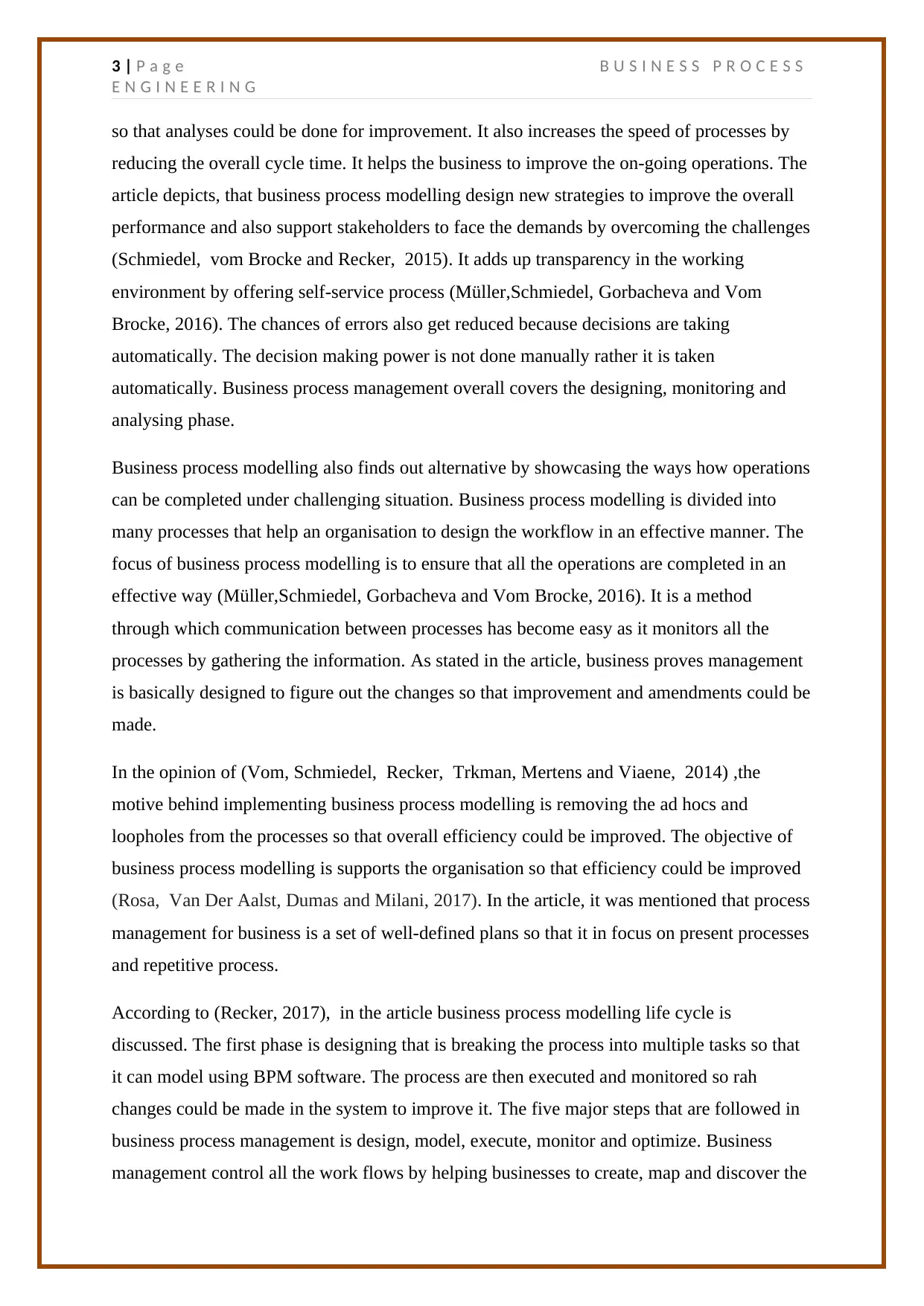
3 | P a g e B U S I N E S S P R O C E S S
E N G I N E E R I N G
so that analyses could be done for improvement. It also increases the speed of processes by
reducing the overall cycle time. It helps the business to improve the on-going operations. The
article depicts, that business process modelling design new strategies to improve the overall
performance and also support stakeholders to face the demands by overcoming the challenges
(Schmiedel, vom Brocke and Recker, 2015). It adds up transparency in the working
environment by offering self-service process (Müller,Schmiedel, Gorbacheva and Vom
Brocke, 2016). The chances of errors also get reduced because decisions are taking
automatically. The decision making power is not done manually rather it is taken
automatically. Business process management overall covers the designing, monitoring and
analysing phase.
Business process modelling also finds out alternative by showcasing the ways how operations
can be completed under challenging situation. Business process modelling is divided into
many processes that help an organisation to design the workflow in an effective manner. The
focus of business process modelling is to ensure that all the operations are completed in an
effective way (Müller,Schmiedel, Gorbacheva and Vom Brocke, 2016). It is a method
through which communication between processes has become easy as it monitors all the
processes by gathering the information. As stated in the article, business proves management
is basically designed to figure out the changes so that improvement and amendments could be
made.
In the opinion of (Vom, Schmiedel, Recker, Trkman, Mertens and Viaene, 2014) ,the
motive behind implementing business process modelling is removing the ad hocs and
loopholes from the processes so that overall efficiency could be improved. The objective of
business process modelling is supports the organisation so that efficiency could be improved
(Rosa, Van Der Aalst, Dumas and Milani, 2017). In the article, it was mentioned that process
management for business is a set of well-defined plans so that it in focus on present processes
and repetitive process.
According to (Recker, 2017), in the article business process modelling life cycle is
discussed. The first phase is designing that is breaking the process into multiple tasks so that
it can model using BPM software. The process are then executed and monitored so rah
changes could be made in the system to improve it. The five major steps that are followed in
business process management is design, model, execute, monitor and optimize. Business
management control all the work flows by helping businesses to create, map and discover the
E N G I N E E R I N G
so that analyses could be done for improvement. It also increases the speed of processes by
reducing the overall cycle time. It helps the business to improve the on-going operations. The
article depicts, that business process modelling design new strategies to improve the overall
performance and also support stakeholders to face the demands by overcoming the challenges
(Schmiedel, vom Brocke and Recker, 2015). It adds up transparency in the working
environment by offering self-service process (Müller,Schmiedel, Gorbacheva and Vom
Brocke, 2016). The chances of errors also get reduced because decisions are taking
automatically. The decision making power is not done manually rather it is taken
automatically. Business process management overall covers the designing, monitoring and
analysing phase.
Business process modelling also finds out alternative by showcasing the ways how operations
can be completed under challenging situation. Business process modelling is divided into
many processes that help an organisation to design the workflow in an effective manner. The
focus of business process modelling is to ensure that all the operations are completed in an
effective way (Müller,Schmiedel, Gorbacheva and Vom Brocke, 2016). It is a method
through which communication between processes has become easy as it monitors all the
processes by gathering the information. As stated in the article, business proves management
is basically designed to figure out the changes so that improvement and amendments could be
made.
In the opinion of (Vom, Schmiedel, Recker, Trkman, Mertens and Viaene, 2014) ,the
motive behind implementing business process modelling is removing the ad hocs and
loopholes from the processes so that overall efficiency could be improved. The objective of
business process modelling is supports the organisation so that efficiency could be improved
(Rosa, Van Der Aalst, Dumas and Milani, 2017). In the article, it was mentioned that process
management for business is a set of well-defined plans so that it in focus on present processes
and repetitive process.
According to (Recker, 2017), in the article business process modelling life cycle is
discussed. The first phase is designing that is breaking the process into multiple tasks so that
it can model using BPM software. The process are then executed and monitored so rah
changes could be made in the system to improve it. The five major steps that are followed in
business process management is design, model, execute, monitor and optimize. Business
management control all the work flows by helping businesses to create, map and discover the
Paraphrase This Document
Need a fresh take? Get an instant paraphrase of this document with our AI Paraphraser
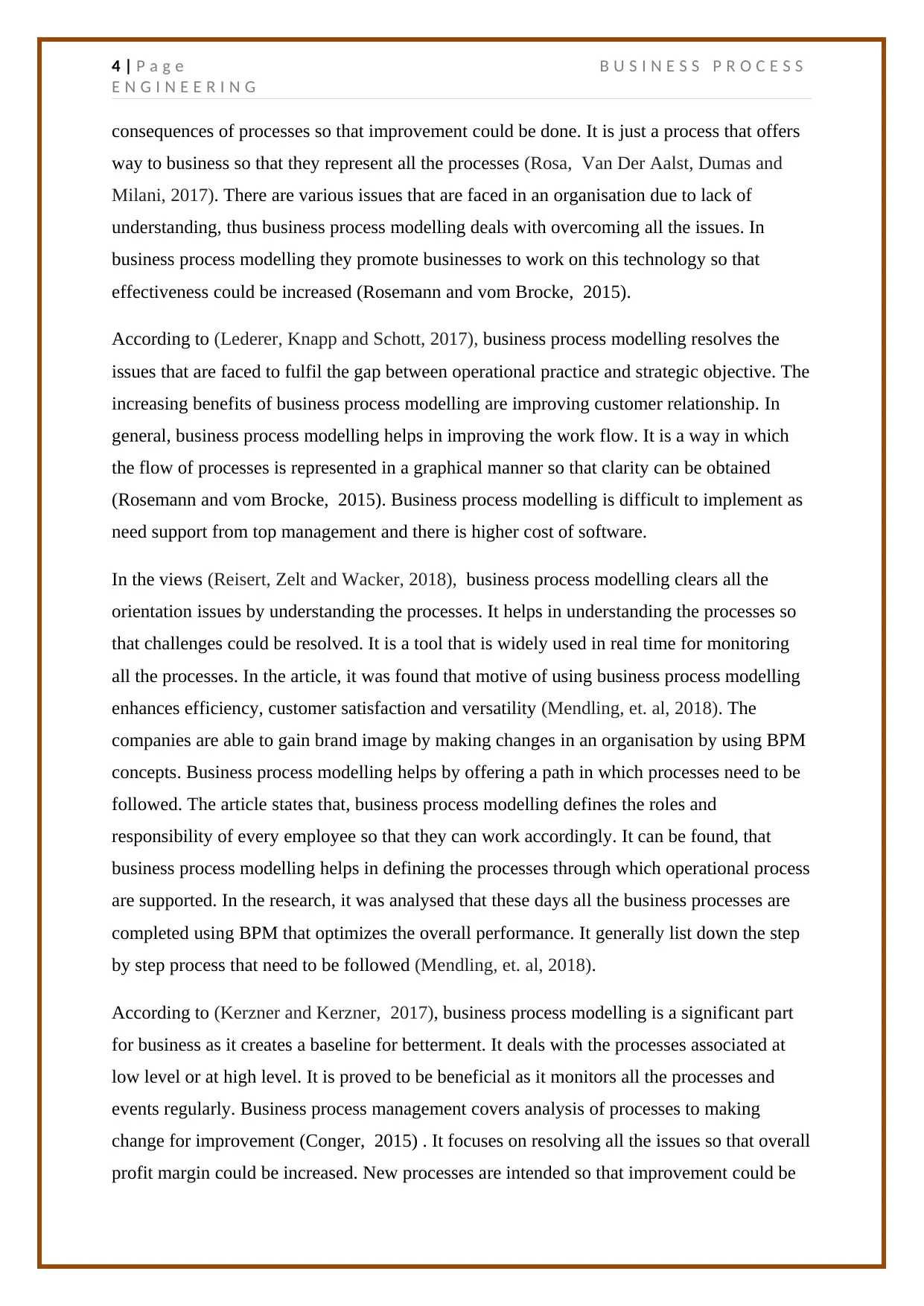
4 | P a g e B U S I N E S S P R O C E S S
E N G I N E E R I N G
consequences of processes so that improvement could be done. It is just a process that offers
way to business so that they represent all the processes (Rosa, Van Der Aalst, Dumas and
Milani, 2017). There are various issues that are faced in an organisation due to lack of
understanding, thus business process modelling deals with overcoming all the issues. In
business process modelling they promote businesses to work on this technology so that
effectiveness could be increased (Rosemann and vom Brocke, 2015).
According to (Lederer, Knapp and Schott, 2017), business process modelling resolves the
issues that are faced to fulfil the gap between operational practice and strategic objective. The
increasing benefits of business process modelling are improving customer relationship. In
general, business process modelling helps in improving the work flow. It is a way in which
the flow of processes is represented in a graphical manner so that clarity can be obtained
(Rosemann and vom Brocke, 2015). Business process modelling is difficult to implement as
need support from top management and there is higher cost of software.
In the views (Reisert, Zelt and Wacker, 2018), business process modelling clears all the
orientation issues by understanding the processes. It helps in understanding the processes so
that challenges could be resolved. It is a tool that is widely used in real time for monitoring
all the processes. In the article, it was found that motive of using business process modelling
enhances efficiency, customer satisfaction and versatility (Mendling, et. al, 2018). The
companies are able to gain brand image by making changes in an organisation by using BPM
concepts. Business process modelling helps by offering a path in which processes need to be
followed. The article states that, business process modelling defines the roles and
responsibility of every employee so that they can work accordingly. It can be found, that
business process modelling helps in defining the processes through which operational process
are supported. In the research, it was analysed that these days all the business processes are
completed using BPM that optimizes the overall performance. It generally list down the step
by step process that need to be followed (Mendling, et. al, 2018).
According to (Kerzner and Kerzner, 2017), business process modelling is a significant part
for business as it creates a baseline for betterment. It deals with the processes associated at
low level or at high level. It is proved to be beneficial as it monitors all the processes and
events regularly. Business process management covers analysis of processes to making
change for improvement (Conger, 2015) . It focuses on resolving all the issues so that overall
profit margin could be increased. New processes are intended so that improvement could be
E N G I N E E R I N G
consequences of processes so that improvement could be done. It is just a process that offers
way to business so that they represent all the processes (Rosa, Van Der Aalst, Dumas and
Milani, 2017). There are various issues that are faced in an organisation due to lack of
understanding, thus business process modelling deals with overcoming all the issues. In
business process modelling they promote businesses to work on this technology so that
effectiveness could be increased (Rosemann and vom Brocke, 2015).
According to (Lederer, Knapp and Schott, 2017), business process modelling resolves the
issues that are faced to fulfil the gap between operational practice and strategic objective. The
increasing benefits of business process modelling are improving customer relationship. In
general, business process modelling helps in improving the work flow. It is a way in which
the flow of processes is represented in a graphical manner so that clarity can be obtained
(Rosemann and vom Brocke, 2015). Business process modelling is difficult to implement as
need support from top management and there is higher cost of software.
In the views (Reisert, Zelt and Wacker, 2018), business process modelling clears all the
orientation issues by understanding the processes. It helps in understanding the processes so
that challenges could be resolved. It is a tool that is widely used in real time for monitoring
all the processes. In the article, it was found that motive of using business process modelling
enhances efficiency, customer satisfaction and versatility (Mendling, et. al, 2018). The
companies are able to gain brand image by making changes in an organisation by using BPM
concepts. Business process modelling helps by offering a path in which processes need to be
followed. The article states that, business process modelling defines the roles and
responsibility of every employee so that they can work accordingly. It can be found, that
business process modelling helps in defining the processes through which operational process
are supported. In the research, it was analysed that these days all the business processes are
completed using BPM that optimizes the overall performance. It generally list down the step
by step process that need to be followed (Mendling, et. al, 2018).
According to (Kerzner and Kerzner, 2017), business process modelling is a significant part
for business as it creates a baseline for betterment. It deals with the processes associated at
low level or at high level. It is proved to be beneficial as it monitors all the processes and
events regularly. Business process management covers analysis of processes to making
change for improvement (Conger, 2015) . It focuses on resolving all the issues so that overall
profit margin could be increased. New processes are intended so that improvement could be
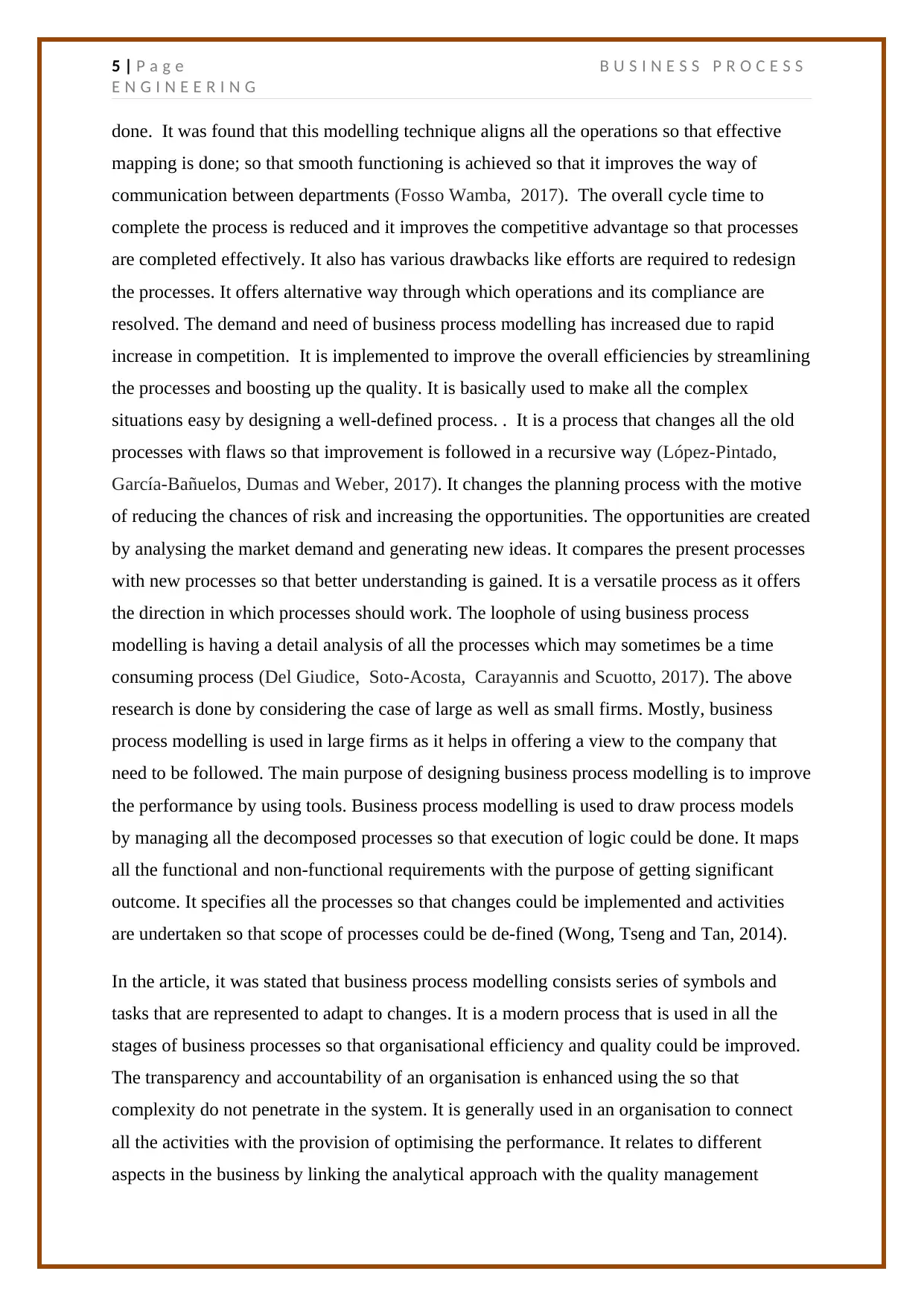
5 | P a g e B U S I N E S S P R O C E S S
E N G I N E E R I N G
done. It was found that this modelling technique aligns all the operations so that effective
mapping is done; so that smooth functioning is achieved so that it improves the way of
communication between departments (Fosso Wamba, 2017). The overall cycle time to
complete the process is reduced and it improves the competitive advantage so that processes
are completed effectively. It also has various drawbacks like efforts are required to redesign
the processes. It offers alternative way through which operations and its compliance are
resolved. The demand and need of business process modelling has increased due to rapid
increase in competition. It is implemented to improve the overall efficiencies by streamlining
the processes and boosting up the quality. It is basically used to make all the complex
situations easy by designing a well-defined process. . It is a process that changes all the old
processes with flaws so that improvement is followed in a recursive way (López-Pintado,
García-Bañuelos, Dumas and Weber, 2017). It changes the planning process with the motive
of reducing the chances of risk and increasing the opportunities. The opportunities are created
by analysing the market demand and generating new ideas. It compares the present processes
with new processes so that better understanding is gained. It is a versatile process as it offers
the direction in which processes should work. The loophole of using business process
modelling is having a detail analysis of all the processes which may sometimes be a time
consuming process (Del Giudice, Soto-Acosta, Carayannis and Scuotto, 2017). The above
research is done by considering the case of large as well as small firms. Mostly, business
process modelling is used in large firms as it helps in offering a view to the company that
need to be followed. The main purpose of designing business process modelling is to improve
the performance by using tools. Business process modelling is used to draw process models
by managing all the decomposed processes so that execution of logic could be done. It maps
all the functional and non-functional requirements with the purpose of getting significant
outcome. It specifies all the processes so that changes could be implemented and activities
are undertaken so that scope of processes could be de-fined (Wong, Tseng and Tan, 2014).
In the article, it was stated that business process modelling consists series of symbols and
tasks that are represented to adapt to changes. It is a modern process that is used in all the
stages of business processes so that organisational efficiency and quality could be improved.
The transparency and accountability of an organisation is enhanced using the so that
complexity do not penetrate in the system. It is generally used in an organisation to connect
all the activities with the provision of optimising the performance. It relates to different
aspects in the business by linking the analytical approach with the quality management
E N G I N E E R I N G
done. It was found that this modelling technique aligns all the operations so that effective
mapping is done; so that smooth functioning is achieved so that it improves the way of
communication between departments (Fosso Wamba, 2017). The overall cycle time to
complete the process is reduced and it improves the competitive advantage so that processes
are completed effectively. It also has various drawbacks like efforts are required to redesign
the processes. It offers alternative way through which operations and its compliance are
resolved. The demand and need of business process modelling has increased due to rapid
increase in competition. It is implemented to improve the overall efficiencies by streamlining
the processes and boosting up the quality. It is basically used to make all the complex
situations easy by designing a well-defined process. . It is a process that changes all the old
processes with flaws so that improvement is followed in a recursive way (López-Pintado,
García-Bañuelos, Dumas and Weber, 2017). It changes the planning process with the motive
of reducing the chances of risk and increasing the opportunities. The opportunities are created
by analysing the market demand and generating new ideas. It compares the present processes
with new processes so that better understanding is gained. It is a versatile process as it offers
the direction in which processes should work. The loophole of using business process
modelling is having a detail analysis of all the processes which may sometimes be a time
consuming process (Del Giudice, Soto-Acosta, Carayannis and Scuotto, 2017). The above
research is done by considering the case of large as well as small firms. Mostly, business
process modelling is used in large firms as it helps in offering a view to the company that
need to be followed. The main purpose of designing business process modelling is to improve
the performance by using tools. Business process modelling is used to draw process models
by managing all the decomposed processes so that execution of logic could be done. It maps
all the functional and non-functional requirements with the purpose of getting significant
outcome. It specifies all the processes so that changes could be implemented and activities
are undertaken so that scope of processes could be de-fined (Wong, Tseng and Tan, 2014).
In the article, it was stated that business process modelling consists series of symbols and
tasks that are represented to adapt to changes. It is a modern process that is used in all the
stages of business processes so that organisational efficiency and quality could be improved.
The transparency and accountability of an organisation is enhanced using the so that
complexity do not penetrate in the system. It is generally used in an organisation to connect
all the activities with the provision of optimising the performance. It relates to different
aspects in the business by linking the analytical approach with the quality management
⊘ This is a preview!⊘
Do you want full access?
Subscribe today to unlock all pages.

Trusted by 1+ million students worldwide

6 | P a g e B U S I N E S S P R O C E S S
E N G I N E E R I N G
approach. It is a diagrammatic representation that that connect all the processes, action and
activities. Business process modelling is used to improve the final output by adding value to
the actions and making the experience better. It works on two approach one is the current
situation that is based on “as in” model and other is the intendant new situation that is based
on the “to be” model. The overall outcome of business process modelling is valuing the
customers and reducing the cost of the company. The increasing use of business process
modelling has some consequences as it has increased the competitive advantage, market
growth and retention of staff.
E N G I N E E R I N G
approach. It is a diagrammatic representation that that connect all the processes, action and
activities. Business process modelling is used to improve the final output by adding value to
the actions and making the experience better. It works on two approach one is the current
situation that is based on “as in” model and other is the intendant new situation that is based
on the “to be” model. The overall outcome of business process modelling is valuing the
customers and reducing the cost of the company. The increasing use of business process
modelling has some consequences as it has increased the competitive advantage, market
growth and retention of staff.
Paraphrase This Document
Need a fresh take? Get an instant paraphrase of this document with our AI Paraphraser
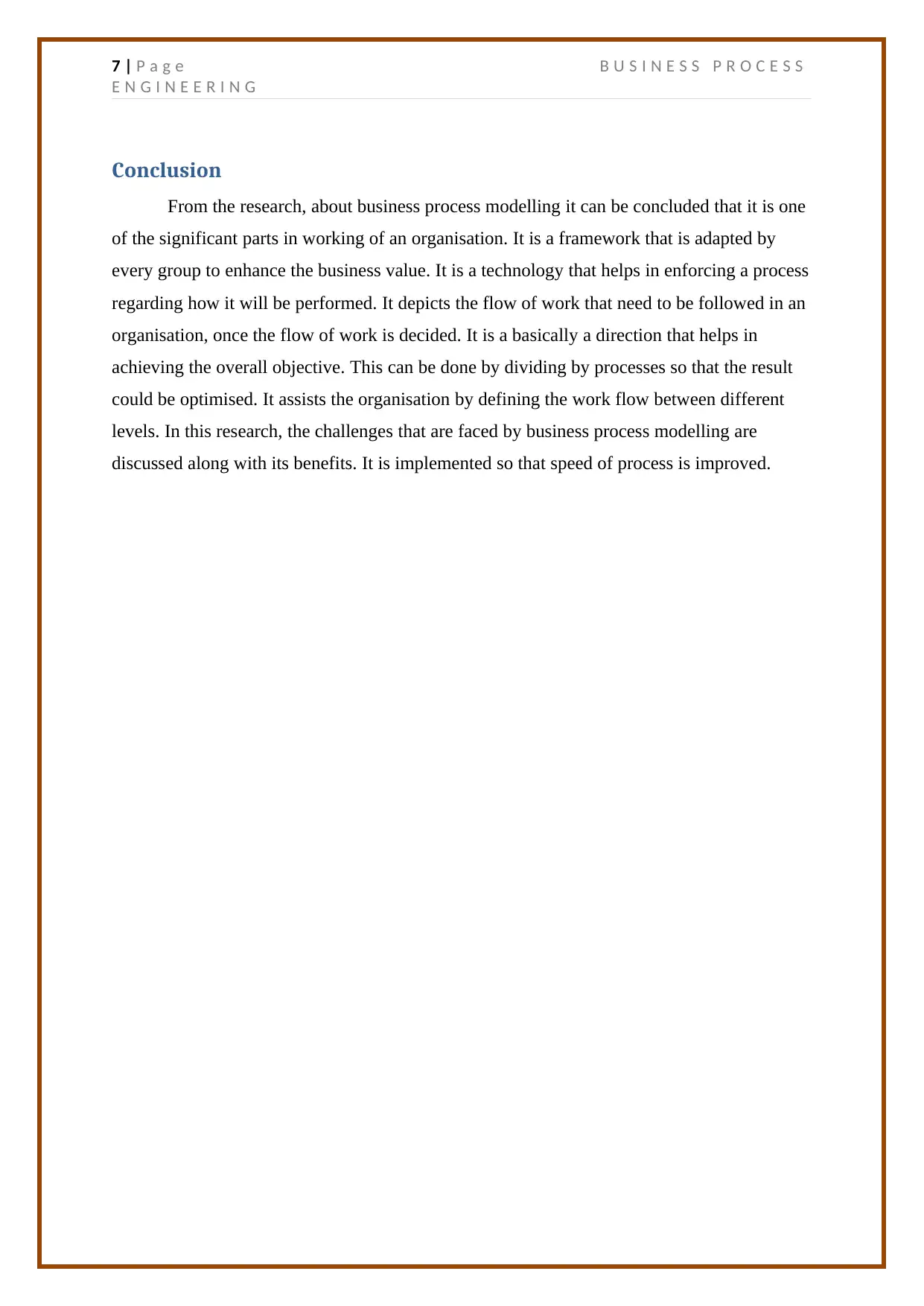
7 | P a g e B U S I N E S S P R O C E S S
E N G I N E E R I N G
Conclusion
From the research, about business process modelling it can be concluded that it is one
of the significant parts in working of an organisation. It is a framework that is adapted by
every group to enhance the business value. It is a technology that helps in enforcing a process
regarding how it will be performed. It depicts the flow of work that need to be followed in an
organisation, once the flow of work is decided. It is a basically a direction that helps in
achieving the overall objective. This can be done by dividing by processes so that the result
could be optimised. It assists the organisation by defining the work flow between different
levels. In this research, the challenges that are faced by business process modelling are
discussed along with its benefits. It is implemented so that speed of process is improved.
E N G I N E E R I N G
Conclusion
From the research, about business process modelling it can be concluded that it is one
of the significant parts in working of an organisation. It is a framework that is adapted by
every group to enhance the business value. It is a technology that helps in enforcing a process
regarding how it will be performed. It depicts the flow of work that need to be followed in an
organisation, once the flow of work is decided. It is a basically a direction that helps in
achieving the overall objective. This can be done by dividing by processes so that the result
could be optimised. It assists the organisation by defining the work flow between different
levels. In this research, the challenges that are faced by business process modelling are
discussed along with its benefits. It is implemented so that speed of process is improved.
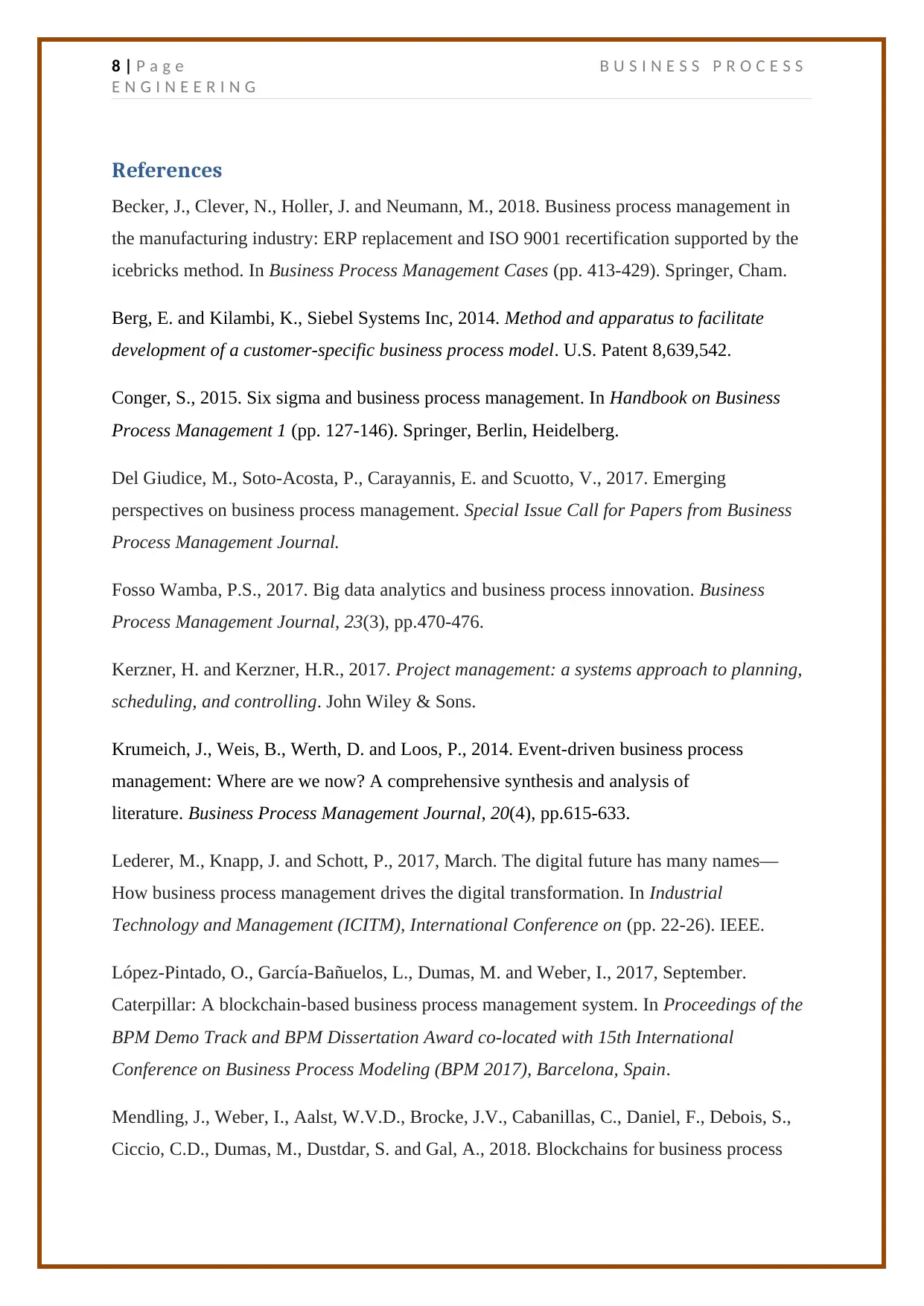
8 | P a g e B U S I N E S S P R O C E S S
E N G I N E E R I N G
References
Becker, J., Clever, N., Holler, J. and Neumann, M., 2018. Business process management in
the manufacturing industry: ERP replacement and ISO 9001 recertification supported by the
icebricks method. In Business Process Management Cases (pp. 413-429). Springer, Cham.
Berg, E. and Kilambi, K., Siebel Systems Inc, 2014. Method and apparatus to facilitate
development of a customer-specific business process model. U.S. Patent 8,639,542.
Conger, S., 2015. Six sigma and business process management. In Handbook on Business
Process Management 1 (pp. 127-146). Springer, Berlin, Heidelberg.
Del Giudice, M., Soto-Acosta, P., Carayannis, E. and Scuotto, V., 2017. Emerging
perspectives on business process management. Special Issue Call for Papers from Business
Process Management Journal.
Fosso Wamba, P.S., 2017. Big data analytics and business process innovation. Business
Process Management Journal, 23(3), pp.470-476.
Kerzner, H. and Kerzner, H.R., 2017. Project management: a systems approach to planning,
scheduling, and controlling. John Wiley & Sons.
Krumeich, J., Weis, B., Werth, D. and Loos, P., 2014. Event-driven business process
management: Where are we now? A comprehensive synthesis and analysis of
literature. Business Process Management Journal, 20(4), pp.615-633.
Lederer, M., Knapp, J. and Schott, P., 2017, March. The digital future has many names—
How business process management drives the digital transformation. In Industrial
Technology and Management (ICITM), International Conference on (pp. 22-26). IEEE.
López-Pintado, O., García-Bañuelos, L., Dumas, M. and Weber, I., 2017, September.
Caterpillar: A blockchain-based business process management system. In Proceedings of the
BPM Demo Track and BPM Dissertation Award co-located with 15th International
Conference on Business Process Modeling (BPM 2017), Barcelona, Spain.
Mendling, J., Weber, I., Aalst, W.V.D., Brocke, J.V., Cabanillas, C., Daniel, F., Debois, S.,
Ciccio, C.D., Dumas, M., Dustdar, S. and Gal, A., 2018. Blockchains for business process
E N G I N E E R I N G
References
Becker, J., Clever, N., Holler, J. and Neumann, M., 2018. Business process management in
the manufacturing industry: ERP replacement and ISO 9001 recertification supported by the
icebricks method. In Business Process Management Cases (pp. 413-429). Springer, Cham.
Berg, E. and Kilambi, K., Siebel Systems Inc, 2014. Method and apparatus to facilitate
development of a customer-specific business process model. U.S. Patent 8,639,542.
Conger, S., 2015. Six sigma and business process management. In Handbook on Business
Process Management 1 (pp. 127-146). Springer, Berlin, Heidelberg.
Del Giudice, M., Soto-Acosta, P., Carayannis, E. and Scuotto, V., 2017. Emerging
perspectives on business process management. Special Issue Call for Papers from Business
Process Management Journal.
Fosso Wamba, P.S., 2017. Big data analytics and business process innovation. Business
Process Management Journal, 23(3), pp.470-476.
Kerzner, H. and Kerzner, H.R., 2017. Project management: a systems approach to planning,
scheduling, and controlling. John Wiley & Sons.
Krumeich, J., Weis, B., Werth, D. and Loos, P., 2014. Event-driven business process
management: Where are we now? A comprehensive synthesis and analysis of
literature. Business Process Management Journal, 20(4), pp.615-633.
Lederer, M., Knapp, J. and Schott, P., 2017, March. The digital future has many names—
How business process management drives the digital transformation. In Industrial
Technology and Management (ICITM), International Conference on (pp. 22-26). IEEE.
López-Pintado, O., García-Bañuelos, L., Dumas, M. and Weber, I., 2017, September.
Caterpillar: A blockchain-based business process management system. In Proceedings of the
BPM Demo Track and BPM Dissertation Award co-located with 15th International
Conference on Business Process Modeling (BPM 2017), Barcelona, Spain.
Mendling, J., Weber, I., Aalst, W.V.D., Brocke, J.V., Cabanillas, C., Daniel, F., Debois, S.,
Ciccio, C.D., Dumas, M., Dustdar, S. and Gal, A., 2018. Blockchains for business process
⊘ This is a preview!⊘
Do you want full access?
Subscribe today to unlock all pages.

Trusted by 1+ million students worldwide
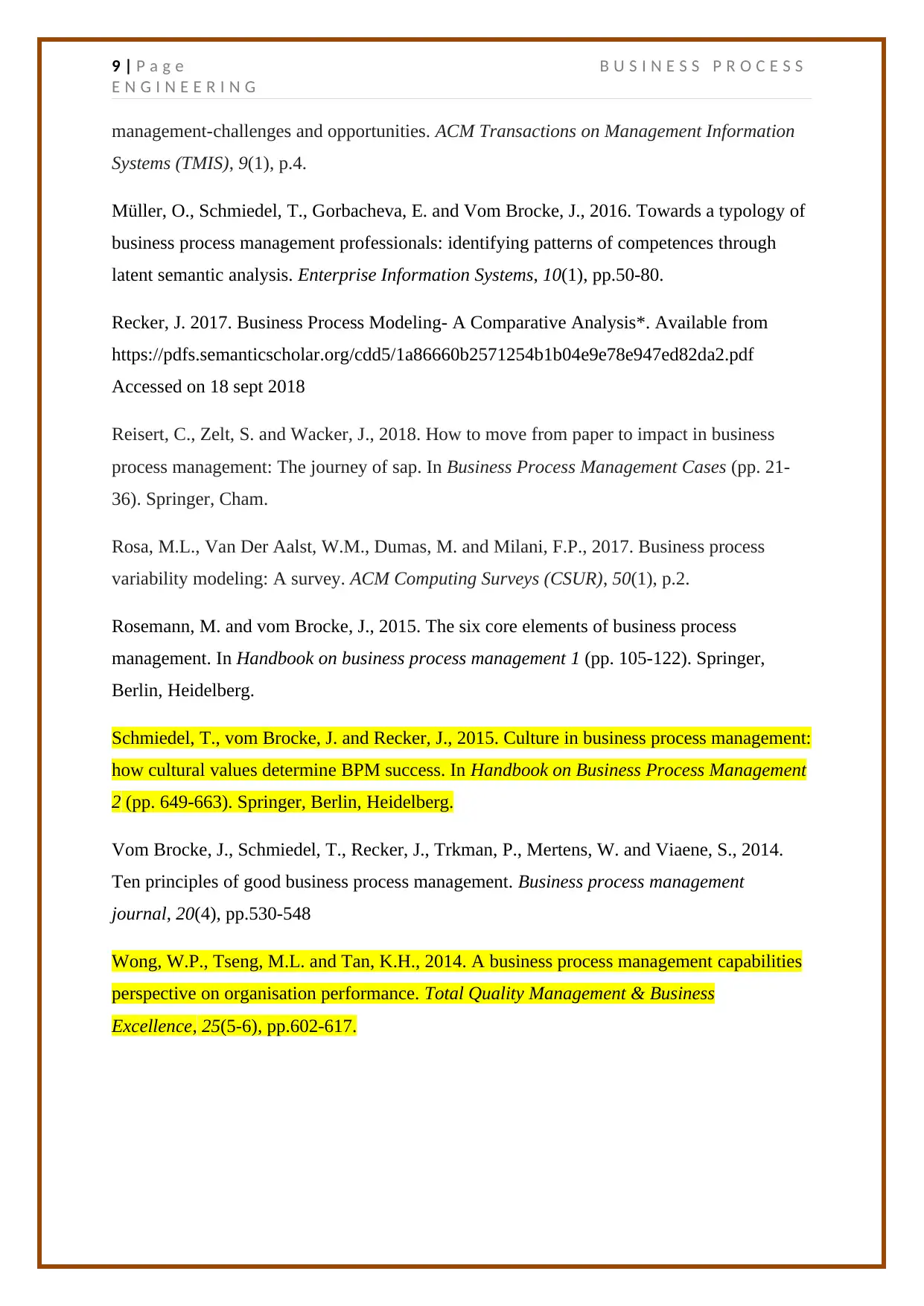
9 | P a g e B U S I N E S S P R O C E S S
E N G I N E E R I N G
management-challenges and opportunities. ACM Transactions on Management Information
Systems (TMIS), 9(1), p.4.
Müller, O., Schmiedel, T., Gorbacheva, E. and Vom Brocke, J., 2016. Towards a typology of
business process management professionals: identifying patterns of competences through
latent semantic analysis. Enterprise Information Systems, 10(1), pp.50-80.
Recker, J. 2017. Business Process Modeling- A Comparative Analysis*. Available from
https://pdfs.semanticscholar.org/cdd5/1a86660b2571254b1b04e9e78e947ed82da2.pdf
Accessed on 18 sept 2018
Reisert, C., Zelt, S. and Wacker, J., 2018. How to move from paper to impact in business
process management: The journey of sap. In Business Process Management Cases (pp. 21-
36). Springer, Cham.
Rosa, M.L., Van Der Aalst, W.M., Dumas, M. and Milani, F.P., 2017. Business process
variability modeling: A survey. ACM Computing Surveys (CSUR), 50(1), p.2.
Rosemann, M. and vom Brocke, J., 2015. The six core elements of business process
management. In Handbook on business process management 1 (pp. 105-122). Springer,
Berlin, Heidelberg.
Schmiedel, T., vom Brocke, J. and Recker, J., 2015. Culture in business process management:
how cultural values determine BPM success. In Handbook on Business Process Management
2 (pp. 649-663). Springer, Berlin, Heidelberg.
Vom Brocke, J., Schmiedel, T., Recker, J., Trkman, P., Mertens, W. and Viaene, S., 2014.
Ten principles of good business process management. Business process management
journal, 20(4), pp.530-548
Wong, W.P., Tseng, M.L. and Tan, K.H., 2014. A business process management capabilities
perspective on organisation performance. Total Quality Management & Business
Excellence, 25(5-6), pp.602-617.
E N G I N E E R I N G
management-challenges and opportunities. ACM Transactions on Management Information
Systems (TMIS), 9(1), p.4.
Müller, O., Schmiedel, T., Gorbacheva, E. and Vom Brocke, J., 2016. Towards a typology of
business process management professionals: identifying patterns of competences through
latent semantic analysis. Enterprise Information Systems, 10(1), pp.50-80.
Recker, J. 2017. Business Process Modeling- A Comparative Analysis*. Available from
https://pdfs.semanticscholar.org/cdd5/1a86660b2571254b1b04e9e78e947ed82da2.pdf
Accessed on 18 sept 2018
Reisert, C., Zelt, S. and Wacker, J., 2018. How to move from paper to impact in business
process management: The journey of sap. In Business Process Management Cases (pp. 21-
36). Springer, Cham.
Rosa, M.L., Van Der Aalst, W.M., Dumas, M. and Milani, F.P., 2017. Business process
variability modeling: A survey. ACM Computing Surveys (CSUR), 50(1), p.2.
Rosemann, M. and vom Brocke, J., 2015. The six core elements of business process
management. In Handbook on business process management 1 (pp. 105-122). Springer,
Berlin, Heidelberg.
Schmiedel, T., vom Brocke, J. and Recker, J., 2015. Culture in business process management:
how cultural values determine BPM success. In Handbook on Business Process Management
2 (pp. 649-663). Springer, Berlin, Heidelberg.
Vom Brocke, J., Schmiedel, T., Recker, J., Trkman, P., Mertens, W. and Viaene, S., 2014.
Ten principles of good business process management. Business process management
journal, 20(4), pp.530-548
Wong, W.P., Tseng, M.L. and Tan, K.H., 2014. A business process management capabilities
perspective on organisation performance. Total Quality Management & Business
Excellence, 25(5-6), pp.602-617.
1 out of 10
Related Documents
Your All-in-One AI-Powered Toolkit for Academic Success.
+13062052269
info@desklib.com
Available 24*7 on WhatsApp / Email
![[object Object]](/_next/static/media/star-bottom.7253800d.svg)
Unlock your academic potential
Copyright © 2020–2026 A2Z Services. All Rights Reserved. Developed and managed by ZUCOL.




